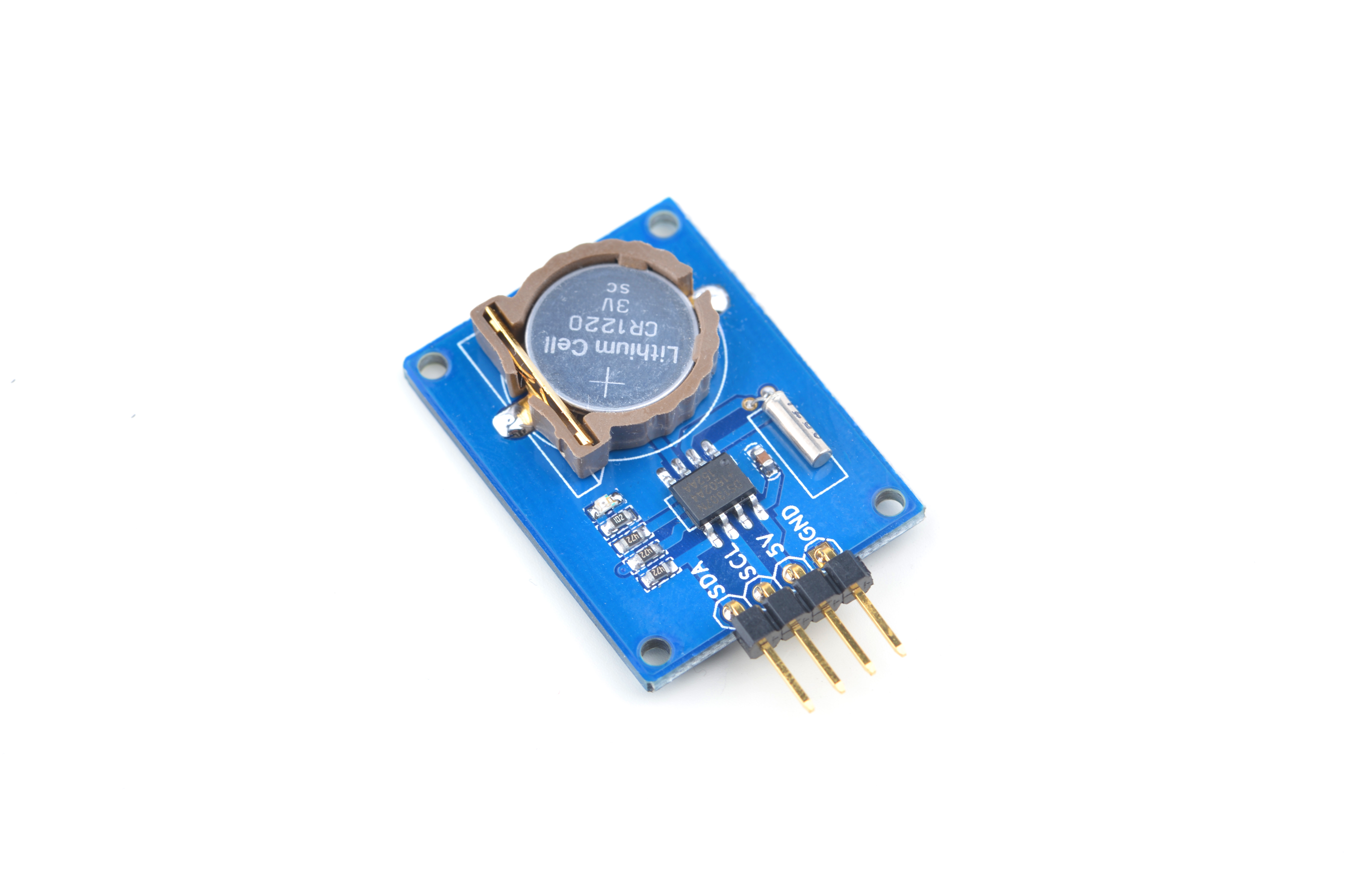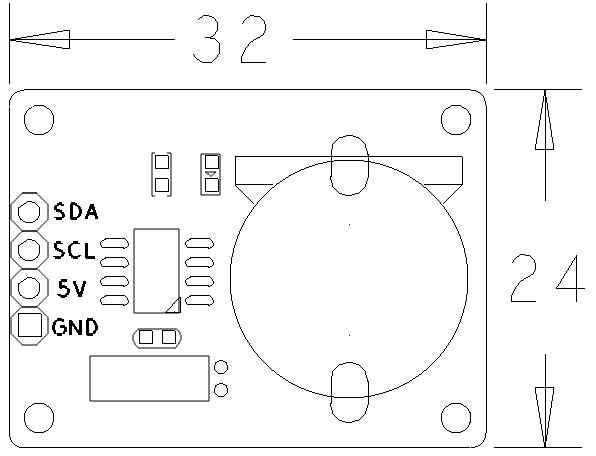Difference between revisions of "Matrix - RTC"
(→编译测试程序) |
(→Features) |
||
| (15 intermediate revisions by 2 users not shown) | |||
| Line 3: | Line 3: | ||
==Introduction== | ==Introduction== | ||
[[File:Matrix-RTC.png|thumb|]] | [[File:Matrix-RTC.png|thumb|]] | ||
| − | * | + | * The Matrix RTC module is a real time clock module. It uses the low power consumption chip DS1307 with valid up to 2100 56 byte nonvolatile RAM for data storage and 2-wire IIC serial interface |
| + | * It counts seconds, minutes, hours, date of the month, month, day of the week, and year with leap year compensation. | ||
| + | |||
==Features== | ==Features== | ||
| − | * | + | * I2C serial interface |
| + | * 56-byte nonvolatile RAM | ||
| + | * 8-Pin DIP and 8-Pin SO | ||
| + | * Working temperature: -40 degree Celsius to 85 degree Celsius | ||
| + | * PCB dimension(mm): 24 x 32 | ||
[[File:Matrix-RTC_PCB.png|frameless|400px|]] | [[File:Matrix-RTC_PCB.png|frameless|400px|]] | ||
| Line 23: | Line 29: | ||
==Basic Device Operation== | ==Basic Device Operation== | ||
| + | |||
| + | ==Applications== | ||
| + | ===Connect to NanoPi M1=== | ||
| + | Refer to the following connection diagram to connect the module to the NanoPi M1:<br> | ||
| + | [[File:Matrix-RTC_nanopi_m1.jpg|frameless|600px|Matrix-RTC_nanopi_m1]] | ||
| + | |||
| + | Connection Details: | ||
| + | {| class="wikitable" | ||
| + | |- | ||
| + | |Matrix-RTC || NanoPi M1 | ||
| + | |- | ||
| + | |SDA || Pin3 | ||
| + | |- | ||
| + | |SCL || Pin5 | ||
| + | |- | ||
| + | |5V || Pin4 | ||
| + | |- | ||
| + | |GND || Pin6 | ||
| + | |} | ||
| + | |||
| + | ===Connect to NanoPi 2=== | ||
| + | Refer to the following connection diagram to connect the module to the NanoPi 2:<br> | ||
| + | [[File:Matrix-RTC_nanopi_2.jpg|frameless|600px|Matrix-RTC_nanopi_2]] | ||
| + | |||
| + | Connection Details: | ||
| + | {| class="wikitable" | ||
| + | |- | ||
| + | |Matrix-RTC || NanoPi 2 | ||
| + | |- | ||
| + | |SDA || Pin3 | ||
| + | |- | ||
| + | |SCL || Pin5 | ||
| + | |- | ||
| + | |5V || Pin4 | ||
| + | |- | ||
| + | |GND || Pin6 | ||
| + | |} | ||
| + | |||
| + | ===Connect to NanoPi M2 / NanoPi 2 Fire=== | ||
| + | Refer to the following connection diagram to connect the module to the NanoPi M2/ NanoPi 2 Fire:<br> | ||
| + | [[File:Matrix-RTC_nanopi_M2.jpg|frameless|600px|Matrix-RTC_nanopi_M2]] | ||
| + | |||
| + | Connection Details: | ||
| + | {| class="wikitable" | ||
| + | |- | ||
| + | | || NanoPi M2 | ||
| + | |- | ||
| + | |SDA || Pin3 | ||
| + | |- | ||
| + | |SCL || Pin5 | ||
| + | |- | ||
| + | |5V || Pin4 | ||
| + | |- | ||
| + | |GND || Pin6 | ||
| + | |} | ||
| + | |||
| + | ===Connect to NanoPC-T2=== | ||
| + | Refer to the following connection diagram to connect the module to the NanoPC-T2:<br> | ||
| + | [[File:Matrix-RTC_NanoPC-T2.jpg|frameless|600px|Matrix-RTC_NanoPC-T2]] | ||
| + | |||
| + | Connection Details: | ||
| + | {| class="wikitable" | ||
| + | |- | ||
| + | |Matrix-RTC || NanoPC-T2 | ||
| + | |- | ||
| + | |SDA || Pin6 | ||
| + | |- | ||
| + | |SCL || Pin5 | ||
| + | |- | ||
| + | |5V || Pin29 | ||
| + | |- | ||
| + | |GND || Pin30 | ||
| + | |} | ||
| + | |||
| + | ==Compile & Run Test Program== | ||
| + | Boot your ARM board with Debian and copy the matrix code: | ||
| + | <syntaxhighlight lang="bash"> | ||
| + | $ apt-get update && apt-get install git | ||
| + | $ git clone https://github.com/friendlyarm/matrix.git | ||
| + | </syntaxhighlight> | ||
| + | If your cloning is done successfully a "matrix" directory will be generated. | ||
| + | |||
| + | Compile and install Matrix: | ||
| + | <syntaxhighlight lang="bash"> | ||
| + | $ cd matrix | ||
| + | $ make && make install | ||
| + | </syntaxhighlight> | ||
| + | |||
| + | Run test program: | ||
| + | <syntaxhighlight lang="bash"> | ||
| + | $ matrix-rtc | ||
| + | </syntaxhighlight> | ||
| + | Note: this module is not plug and play therefore before running the module please make sure it is connected to an ARM board.<br> | ||
| + | Here is what you should observe:<br> | ||
| + | <syntaxhighlight lang="bash"> | ||
| + | RTC Driver Test Example. | ||
| + | Set RTC date/time is 9-15-2015, 01:01:01. | ||
| + | Read RTC date/time is 9-15-2015, 01:01:01. | ||
| + | Test complete | ||
| + | </syntaxhighlight> | ||
| + | This program reads date/time from and writes date/time to the RTC module. If you want to set the date/time and save it in the RTC module under Debian you can try the following commands. For example if you want to set the date to "2016-11-17 17:26:01" and save it in the RTC module you can do it this way: | ||
| + | <syntaxhighlight lang="bash"> | ||
| + | $ modprobe rtc-ds1307 | ||
| + | $ date -s "2016-11-17 17:26:01" | ||
| + | $ hwclock -w -f /dev/rtc-ds1307 | ||
| + | </syntaxhighlight> | ||
| + | Open the /etc/modprobe.d/matrix-blacklist.conf file and add a "#" in front of "blacklist rtc_ds1307" to comment this line. After you reboot your board the changed date/time will be effective<br> | ||
| + | <syntaxhighlight lang="bash"> | ||
| + | $ hwclock -r -f /dev/rtc-ds1307 | ||
| + | 2016 11 18 Friday 08:29:48 -0.492649 seconds | ||
| + | </syntaxhighlight> | ||
| + | |||
| + | ==Code Sample== | ||
| + | This Matrix code sample can work with all the ARM boards mentioned in this module's wiki. The name of this code sample is "matrix-rtc". Here is its source code: | ||
| + | <syntaxhighlight lang="c"> | ||
| + | int main(int argc, char **argv) | ||
| + | { | ||
| + | int fd, retval, board; | ||
| + | struct rtc_time rtc_tm; | ||
| + | const char *rtc = default_rtc; | ||
| + | const char *date_time = default_date_time; | ||
| + | |||
| + | if ((board = boardInit()) < 0) { | ||
| + | printf("Fail to init board\n"); | ||
| + | return -1; | ||
| + | } | ||
| + | |||
| + | switch (argc) { | ||
| + | case 3: | ||
| + | rtc = argv[1]; | ||
| + | date_time = argv[2]; | ||
| + | break; | ||
| + | case 1: | ||
| + | break; | ||
| + | default: | ||
| + | fprintf(stderr, "usage: rtctest [rtcdev] [year mon day hour min sec]\n"); | ||
| + | return 1; | ||
| + | } | ||
| + | system("modprobe "DRIVER_MODULE); | ||
| + | fd = open(rtc, O_RDONLY); | ||
| + | if (fd == -1) { | ||
| + | perror(rtc); | ||
| + | goto err; | ||
| + | } | ||
| + | fprintf(stderr, "RTC Driver Test Example.\n"); | ||
| + | |||
| + | sscanf(date_time, "%d %d %d %d %d %d", | ||
| + | &rtc_tm.tm_year, | ||
| + | &rtc_tm.tm_mon, | ||
| + | &rtc_tm.tm_mday, | ||
| + | &rtc_tm.tm_hour, | ||
| + | &rtc_tm.tm_min, | ||
| + | &rtc_tm.tm_sec); | ||
| + | rtc_tm.tm_year -= 1900; | ||
| + | rtc_tm.tm_mon -= 1; | ||
| + | retval = ioctl(fd, RTC_SET_TIME, &rtc_tm); | ||
| + | if (retval == -1) { | ||
| + | perror("RTC_SET_TIME ioctl"); | ||
| + | goto err; | ||
| + | } | ||
| + | |||
| + | fprintf(stderr, "Set RTC date/time is %d-%d-%d, %02d:%02d:%02d.\n", | ||
| + | rtc_tm.tm_mon + 1, rtc_tm.tm_mday, rtc_tm.tm_year + 1900, | ||
| + | rtc_tm.tm_hour, rtc_tm.tm_min, rtc_tm.tm_sec); | ||
| + | |||
| + | /* Read the RTC time/date */ | ||
| + | retval = ioctl(fd, RTC_RD_TIME, &rtc_tm); | ||
| + | if (retval == -1) { | ||
| + | perror("RTC_RD_TIME ioctl"); | ||
| + | goto err; | ||
| + | } | ||
| + | |||
| + | fprintf(stderr, "Read RTC date/time is %d-%d-%d, %02d:%02d:%02d.\n", | ||
| + | rtc_tm.tm_mon + 1, rtc_tm.tm_mday, rtc_tm.tm_year + 1900, | ||
| + | rtc_tm.tm_hour, rtc_tm.tm_min, rtc_tm.tm_sec); | ||
| + | |||
| + | fprintf(stderr, "Test complete\n"); | ||
| + | close(fd); | ||
| + | err: | ||
| + | system("rmmod "DRIVER_MODULE); | ||
| + | return 0; | ||
| + | } | ||
| + | </syntaxhighlight> | ||
| + | For more details about this APIs called in this code sample refer to [[Matrix API reference manual]] <br> | ||
| + | |||
| + | <!--- | ||
==Download Matrix Source Code== | ==Download Matrix Source Code== | ||
| − | All the matrix modules' code samples are open source. They are maintained on GitHub - | + | All the matrix modules' code samples are open source. They are maintained on GitHub - https://github.com/friendlyarm/matrix.git <br> |
Each branch in this hub contains the matrix modules' code samples for a board that the matrix modules can work with.<br> | Each branch in this hub contains the matrix modules' code samples for a board that the matrix modules can work with.<br> | ||
* The nanopi branch contains the matrix modules' code samples for the NanoPi | * The nanopi branch contains the matrix modules' code samples for the NanoPi | ||
| Line 38: | Line 230: | ||
Clone the matrix code from GitHub | Clone the matrix code from GitHub | ||
<syntaxhighlight lang="bash"> | <syntaxhighlight lang="bash"> | ||
| − | $ git clone | + | $ git clone https://github.com/friendlyarm/matrix.git |
</syntaxhighlight> | </syntaxhighlight> | ||
If this is successful a "matrix" directory will be generated, which will contain all the matrix modules' code samples. | If this is successful a "matrix" directory will be generated, which will contain all the matrix modules' code samples. | ||
| Line 89: | Line 281: | ||
Generated library files are under the "install/lib" directory. Applications are under the "install/usr/bin" directory. The test program for the "Matrix-RTC" module is "matrix-rtc". <br> | Generated library files are under the "install/lib" directory. Applications are under the "install/usr/bin" directory. The test program for the "Matrix-RTC" module is "matrix-rtc". <br> | ||
| − | === | + | ===Run Test Program=== |
| − | + | Please copy the library files and test program to the NanoPi | |
<syntaxhighlight lang="bash"> | <syntaxhighlight lang="bash"> | ||
$ cp install/usr/bin/* nanopi_rootfs/usr/bin/ | $ cp install/usr/bin/* nanopi_rootfs/usr/bin/ | ||
| Line 96: | Line 288: | ||
</syntaxhighlight> | </syntaxhighlight> | ||
| − | + | Power on the NanoPi and run the following command in Debian's terminal to load the driver | |
<syntaxhighlight lang="bash"> | <syntaxhighlight lang="bash"> | ||
$ modprobe rtc-ds1307 | $ modprobe rtc-ds1307 | ||
</syntaxhighlight> | </syntaxhighlight> | ||
| − | + | Run the test program <br> | |
| − | + | Note: this module is not plug and play therefore before running the module please make sure it is connected to a NanoPi. | |
<syntaxhighlight lang="bash"> | <syntaxhighlight lang="bash"> | ||
$ matrix-rtc | $ matrix-rtc | ||
</syntaxhighlight> | </syntaxhighlight> | ||
| − | === | + | ===Code Sample=== |
<syntaxhighlight lang="c"> | <syntaxhighlight lang="c"> | ||
static const char default_rtc[] = "/dev/rtc0"; | static const char default_rtc[] = "/dev/rtc0"; | ||
| Line 174: | Line 366: | ||
</syntaxhighlight> | </syntaxhighlight> | ||
| − | == | + | ==Connect to Tiny4412== |
| − | === | + | ===Preparations=== |
| − | + | Please refer to the Tiny4412's user's manual to install a UbuntuCore on the Tiny4412 and install an appropriate cross compiler on a PC.<br> | |
| − | + | Note: only the Tiny4412SDK-1506 carrier board can work with this module. | |
| − | === | + | ===Hardware Connection=== |
| − | + | Please refer to the following diagram to connect the Matrix-RTC to the Tiny4412 <br> | |
[[File:Matrix-RTC_tiny4412.jpg|frameless|600px|Matrix-RTC_tiny4412]] | [[File:Matrix-RTC_tiny4412.jpg|frameless|600px|Matrix-RTC_tiny4412]] | ||
| − | + | Connection Details: | |
{| class="wikitable" | {| class="wikitable" | ||
|- | |- | ||
| Line 197: | Line 389: | ||
|} | |} | ||
| − | === | + | ===Compile Test Program=== |
| − | + | Please login the Matrix hub and enter the matrix-tiny4412 branch | |
<syntaxhighlight lang="bash"> | <syntaxhighlight lang="bash"> | ||
$ cd matrix | $ cd matrix | ||
| Line 204: | Line 396: | ||
</syntaxhighlight> | </syntaxhighlight> | ||
| − | + | Compile the Matrix code | |
<syntaxhighlight lang="bash"> | <syntaxhighlight lang="bash"> | ||
$ make CROSS_COMPILE=arm-linux-gnueabihf- clean | $ make CROSS_COMPILE=arm-linux-gnueabihf- clean | ||
| Line 210: | Line 402: | ||
$ make CROSS_COMPILE=arm-linux-gnueabihf- install | $ make CROSS_COMPILE=arm-linux-gnueabihf- install | ||
</syntaxhighlight> | </syntaxhighlight> | ||
| − | + | Note: please make sure to install the cross compiler "arm-linux-gnueabihf-gcc-4.7.3" on your PC, which is used to compile files for the Tiny4412-UbuntuCore.<br> | |
| − | + | Generated library files are under the "install/lib" directory. Applications are under the "install/usr/bin" directory. The test program for the "Matrix-RTC" module is "matrix-rtc". | |
| − | === | + | ===Run Test Program=== |
| − | + | Please copy the library files and test program to the Tiny4412 | |
<syntaxhighlight lang="bash"> | <syntaxhighlight lang="bash"> | ||
$ cp install/usr/bin/* tiny4412_rootfs/usr/bin/ | $ cp install/usr/bin/* tiny4412_rootfs/usr/bin/ | ||
| Line 220: | Line 412: | ||
</syntaxhighlight> | </syntaxhighlight> | ||
| − | + | Power on the Tiny4412 and run the following command in UbuntuCore's terminal to load the driver. | |
<syntaxhighlight lang="bash"> | <syntaxhighlight lang="bash"> | ||
$ modprobe bmp085-i2c | $ modprobe bmp085-i2c | ||
</syntaxhighlight> | </syntaxhighlight> | ||
| − | + | Run the test program <br> | |
| − | + | Note: this module is not plug and play therefore before running the module please make sure it is connected to a Tiny4412. | |
<syntaxhighlight lang="bash"> | <syntaxhighlight lang="bash"> | ||
$ matrix-rtc | $ matrix-rtc | ||
</syntaxhighlight> | </syntaxhighlight> | ||
| − | === | + | ===Code Sample=== |
<syntaxhighlight lang="c"> | <syntaxhighlight lang="c"> | ||
static const char default_rtc[] = "/dev/rtc0"; | static const char default_rtc[] = "/dev/rtc0"; | ||
| Line 298: | Line 490: | ||
</syntaxhighlight> | </syntaxhighlight> | ||
| − | == | + | ==Connect to RaspberryPi== |
| − | == | + | ==Connect to Arduino== |
| − | + | ---> | |
| − | == | + | ==Resources== |
[http://datasheets.maximintegrated.com/en/ds/DS1307.pdf DS1307.pdf] | [http://datasheets.maximintegrated.com/en/ds/DS1307.pdf DS1307.pdf] | ||
| + | |||
| + | ==Update Log== | ||
| + | ===June-24-2016=== | ||
| + | * Created English wiki | ||
Latest revision as of 00:28, 24 June 2016
Contents
1 Introduction
- The Matrix RTC module is a real time clock module. It uses the low power consumption chip DS1307 with valid up to 2100 56 byte nonvolatile RAM for data storage and 2-wire IIC serial interface
- It counts seconds, minutes, hours, date of the month, month, day of the week, and year with leap year compensation.
2 Features
- I2C serial interface
- 56-byte nonvolatile RAM
- 8-Pin DIP and 8-Pin SO
- Working temperature: -40 degree Celsius to 85 degree Celsius
- PCB dimension(mm): 24 x 32
- Pin Description:
| Pin | Description |
| SDA | I2C SDA |
| SCL | I2C SCL |
| 5V | Supply Voltage 5V |
| GND | Ground |
3 Basic Device Operation
4 Applications
4.1 Connect to NanoPi M1
Refer to the following connection diagram to connect the module to the NanoPi M1:
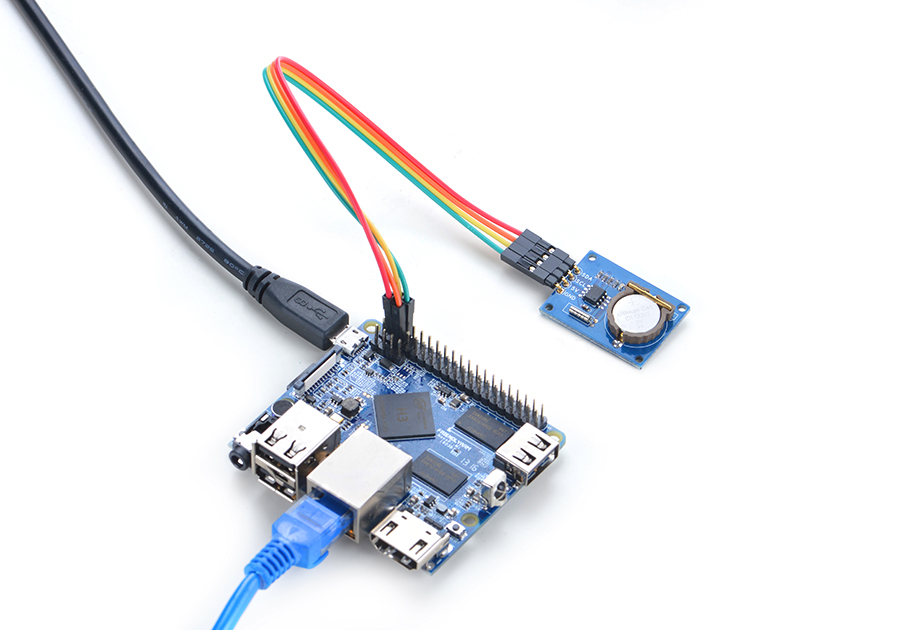
Connection Details:
| Matrix-RTC | NanoPi M1 |
| SDA | Pin3 |
| SCL | Pin5 |
| 5V | Pin4 |
| GND | Pin6 |
4.2 Connect to NanoPi 2
Refer to the following connection diagram to connect the module to the NanoPi 2:
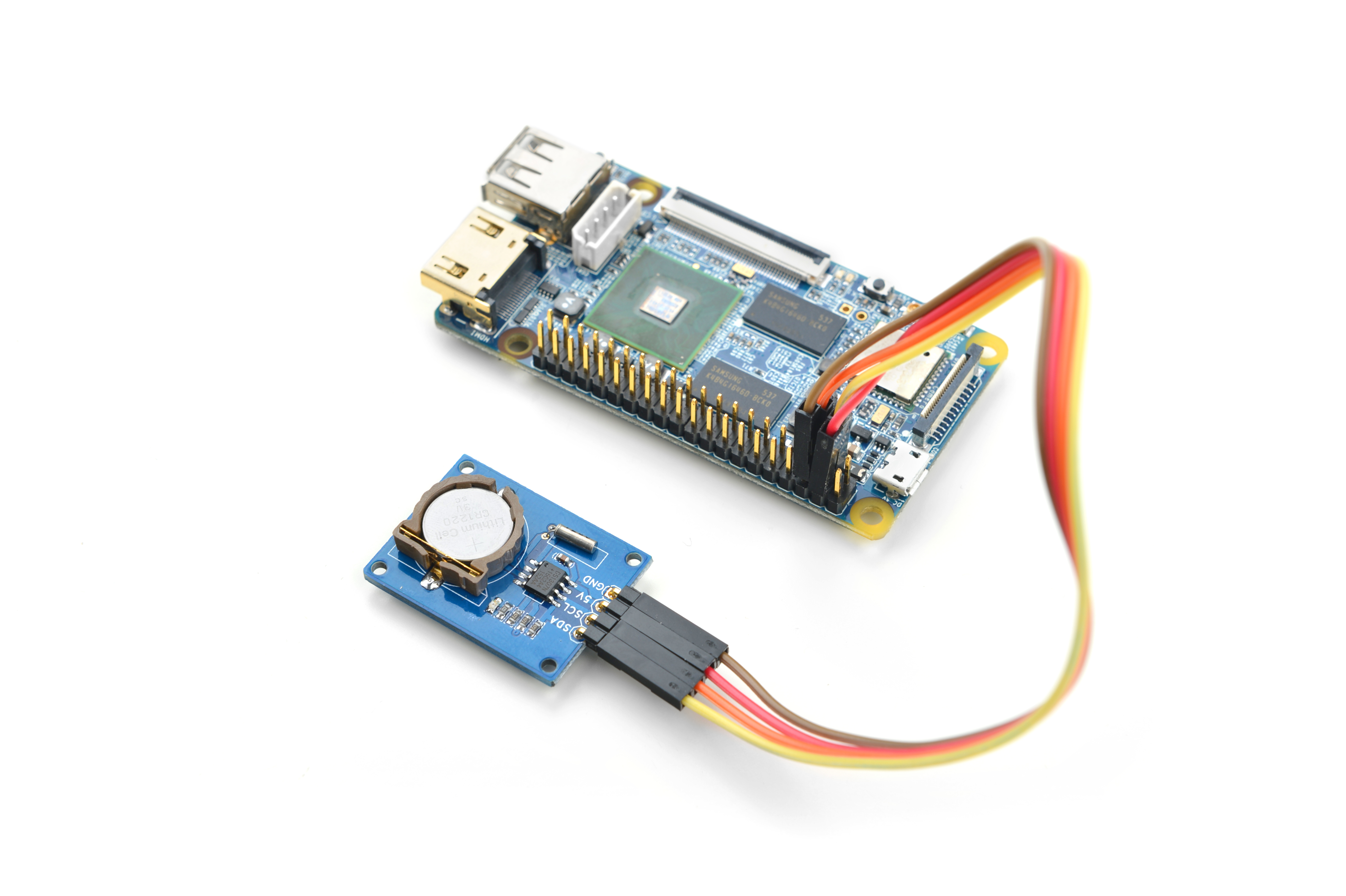
Connection Details:
| Matrix-RTC | NanoPi 2 |
| SDA | Pin3 |
| SCL | Pin5 |
| 5V | Pin4 |
| GND | Pin6 |
4.3 Connect to NanoPi M2 / NanoPi 2 Fire
Refer to the following connection diagram to connect the module to the NanoPi M2/ NanoPi 2 Fire:
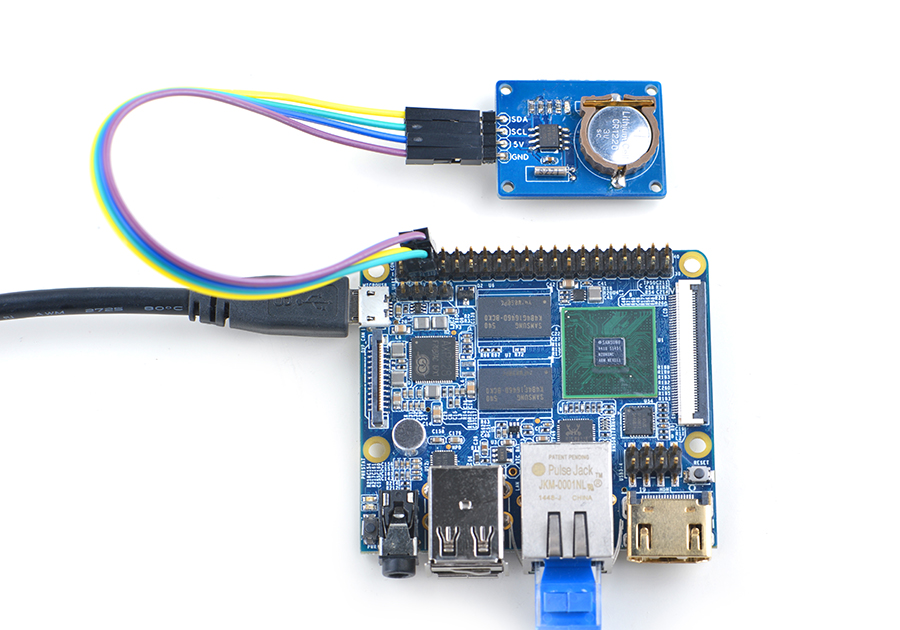
Connection Details:
| NanoPi M2 | |
| SDA | Pin3 |
| SCL | Pin5 |
| 5V | Pin4 |
| GND | Pin6 |
4.4 Connect to NanoPC-T2
Refer to the following connection diagram to connect the module to the NanoPC-T2:
Matrix-RTC_NanoPC-T2
Connection Details:
| Matrix-RTC | NanoPC-T2 |
| SDA | Pin6 |
| SCL | Pin5 |
| 5V | Pin29 |
| GND | Pin30 |
5 Compile & Run Test Program
Boot your ARM board with Debian and copy the matrix code:
$ apt-get update && apt-get install git $ git clone https://github.com/friendlyarm/matrix.git
If your cloning is done successfully a "matrix" directory will be generated.
Compile and install Matrix:
$ cd matrix $ make && make install
Run test program:
$ matrix-rtcNote: this module is not plug and play therefore before running the module please make sure it is connected to an ARM board.
Here is what you should observe:
RTC Driver Test Example. Set RTC date/time is 9-15-2015, 01:01:01. Read RTC date/time is 9-15-2015, 01:01:01. Test complete
This program reads date/time from and writes date/time to the RTC module. If you want to set the date/time and save it in the RTC module under Debian you can try the following commands. For example if you want to set the date to "2016-11-17 17:26:01" and save it in the RTC module you can do it this way:
$ modprobe rtc-ds1307 $ date -s "2016-11-17 17:26:01" $ hwclock -w -f /dev/rtc-ds1307
Open the /etc/modprobe.d/matrix-blacklist.conf file and add a "#" in front of "blacklist rtc_ds1307" to comment this line. After you reboot your board the changed date/time will be effective
$ hwclock -r -f /dev/rtc-ds1307 2016 11 18 Friday 08:29:48 -0.492649 seconds
6 Code Sample
This Matrix code sample can work with all the ARM boards mentioned in this module's wiki. The name of this code sample is "matrix-rtc". Here is its source code:
int main(int argc, char **argv) { int fd, retval, board; struct rtc_time rtc_tm; const char *rtc = default_rtc; const char *date_time = default_date_time; if ((board = boardInit()) < 0) { printf("Fail to init board\n"); return -1; } switch (argc) { case 3: rtc = argv[1]; date_time = argv[2]; break; case 1: break; default: fprintf(stderr, "usage: rtctest [rtcdev] [year mon day hour min sec]\n"); return 1; } system("modprobe "DRIVER_MODULE); fd = open(rtc, O_RDONLY); if (fd == -1) { perror(rtc); goto err; } fprintf(stderr, "RTC Driver Test Example.\n"); sscanf(date_time, "%d %d %d %d %d %d", &rtc_tm.tm_year, &rtc_tm.tm_mon, &rtc_tm.tm_mday, &rtc_tm.tm_hour, &rtc_tm.tm_min, &rtc_tm.tm_sec); rtc_tm.tm_year -= 1900; rtc_tm.tm_mon -= 1; retval = ioctl(fd, RTC_SET_TIME, &rtc_tm); if (retval == -1) { perror("RTC_SET_TIME ioctl"); goto err; } fprintf(stderr, "Set RTC date/time is %d-%d-%d, %02d:%02d:%02d.\n", rtc_tm.tm_mon + 1, rtc_tm.tm_mday, rtc_tm.tm_year + 1900, rtc_tm.tm_hour, rtc_tm.tm_min, rtc_tm.tm_sec); /* Read the RTC time/date */ retval = ioctl(fd, RTC_RD_TIME, &rtc_tm); if (retval == -1) { perror("RTC_RD_TIME ioctl"); goto err; } fprintf(stderr, "Read RTC date/time is %d-%d-%d, %02d:%02d:%02d.\n", rtc_tm.tm_mon + 1, rtc_tm.tm_mday, rtc_tm.tm_year + 1900, rtc_tm.tm_hour, rtc_tm.tm_min, rtc_tm.tm_sec); fprintf(stderr, "Test complete\n"); close(fd); err: system("rmmod "DRIVER_MODULE); return 0; }
For more details about this APIs called in this code sample refer to Matrix API reference manual
7 Resources
8 Update Log
8.1 June-24-2016
- Created English wiki
